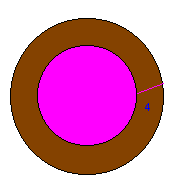Quadratic Inequalities
- Solving Quadratic Equations
We solve quadratic equations by either factoring or using the quadratic formula.
Definition of the Discriminant
We define the discriminant of the quadratic
ax2 + bx + c
asD = b2 - 4ac
The discriminant is the number under the square root in the quadratic formula. We immediately get
D # of Roots > 0 2 < 0 0 0 1
Example
How many roots does1045456564x2 + 3x + 2134534265256
have?
Solution
It is clear that 4ac is larger than b2 = 9.
Hence
D = 9 - 4ac < 0
So that the quadratic has no real roots.
-
Quadratic Inequalities
Example:Solve
x2 - x - 6 > 0
Solution:
First we solve the equality by factoring:(x - 3)(x + 2) = 0
Hence
x = -2 or x = 3Next we cut the number line into three regions:
x < -2, -2 < x < 3, and x > 3On the first region (test x = -3), the quadratic is positive, on the second region (test x = 0) the quadratic is negative, and on the third region (test x = 5) the quadratic is positive.
Region Test Value y-Value Sign x < 2 x = -3 y = 6 + -2 < x < 3 x = 0 y = -6 - x > 3 x = 5 y = 14 +
We are after the positive values since the equation is "> 0".Hence our solution is region 1 and region 2.x < -2 or x > 3
We will see how to verify this on a graphing calculator by noticing that
y = x2 - x - 6
stays above the x-axis when x < -2 and when x > 3.
-
Applications
A 4 ft walkway surrounds a circular flower garden, as shown in the sketch. The area of the walk is 44% of the area of the garden. Find the radius of the garden.

Solution:
Area of the walk = p(4 + r)2 - p( r)2 = .44(p)( r)2Dividing by p we have,
(4 + r)2 - r2 = .44r2
multiplying out, we get,16 + 8r + r2 -r2 = .44r2
or.44r2 -8r -16
Now use the quadratic formula:
a = .44, b = -8, c = -16
so
r = 1.1 or r = -.1
since -.1 does not make sense, we can say that the radius of the garden is 1.1feet.
Example:
The profit function for burgers at Heavenly is given byP = 35x - x2/25,000,000 - 40,000.
Where x represents the number of skiers that come on a given day. How many skiers paying for Heavenly will produce the maximal profit?
Back to the Math Department Home
e-mail Questions and Suggestions